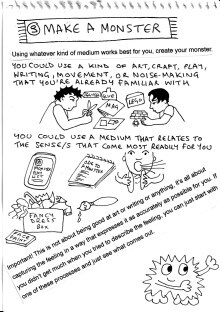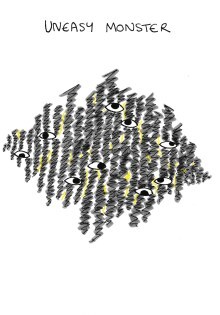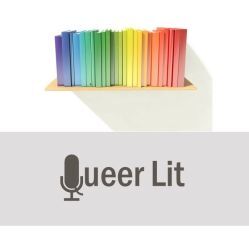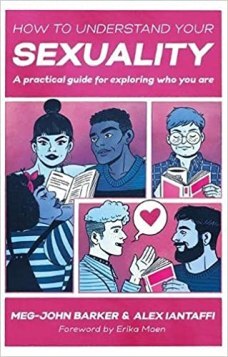Meg-John Barker's Blog, page 4
April 22, 2022
New Zines! Welcome Monster Feelings!
Announcing two new zines for the price of one!
The team who brought you Staying With Feelings and Plural Selves, now brings you Welcome Monster Feelings – a zine of comics illustrating feelings as monsters – and Welcoming Your Monster Feelings – a zine about how to do the monster feelings practice (if you want to).
Here’s a taster…



You can download the zines on our zine page, or here.
Welcoming Your Monster Feelings
Coming soon! Interview with the artist.
The post New Zines! Welcome Monster Feelings! appeared first on Rewriting The Rules.
March 30, 2022
Mismatched sexual desires
Thanks so much to Charlotte Dingle for including me in this great piece about navigating differences in libido late last year. You can read my full interview below.
Do mismatched sex drives have to be a dealbreaker?Not at all, in fact it would be highly unusual if any two people did not have differences – often significant differences – in terms of the amount and kind of sex they want. It would be great if we could assume, going into relationships, that this would be the case and talk openly about how we’d like to navigate these discrepancies. Unfortunately there’s a huge cultural mythology that if a relationship is ‘right’ we’ll be matched in terms of our sex drives and desires. This means that people find it very hard to acknowledge, and get support around it, when that’s not the case.
How can a compromise be reached without the partner(s) with the higher sex drive feeling unwanted and/or the partner(s) with the lower sex drive feeling coerced?It’s very useful to untangle sex from other things where possible. Instead of thinking, or saying, ‘I want sex’ we can tune in and identify what we really want, and then assess whether sex is the only way to get there. In your example it sounds like somebody wants to feel wanted by their partner. Can they explore where that ‘wanting to be wanted’ comes from, and what range of experiences give them that feeling? It’s very helpful to tune into what we really want and need, so we can take the pressure off sex being the only thing that can fulfill those wants and needs.
It can also help to make a sexual venn diagram, of overlapping circles for the people in the relationship, where we include all of our sexual desires in the circles, with the ones we share in the overlapping part. Then we can have conversations about how we might connect in ways where we can enjoy those overlapping desires. We can also talk about the ways in which each person might be able to explore and enjoy the desires they have that are not in the overlap. In consensually non-monogamous relationships that might be with other people, in monogamous relationships it might be in giving everyone time and space for solo sex of various kinds, for example.
 What about situations where there is a kink vs vanilla compromise to be made?
What about situations where there is a kink vs vanilla compromise to be made? This is no different to the previous example really. Again if we assume that there will always be differences in desires, then kink/vanilla is just one of the ways those differences might show up, and it’s up to each relationships to keep returning to the ways in which each person might explore and enjoy those desires which aren’t compatible.
In this case, however, it is probably worth unpacking more what’s meant by ‘kink’ and ‘vanillia’. Rather than assuming, it may be more helpful to list all of the erotic desires and fantasies each person has and mapping them on the venn diagram. It may be there are some compatibilities that show up when we don’t assume what counts as ‘kink’ or ‘vanilla’.
How common would you say this issue is, especially in LGBTQ+ and poly relationships?It is extremely common among everybody. Given that all our sex drives and desires shift and change over time, even if we were 100% compatible at one point in time (unlikely!) then that won’t be true for the whole length of our relationship. It’s way more helpful to assume that we’ll fluctuate over time. There can be some more acceptance of sexual fluidity in LGBTQ+ communities, but there can also be a carry-over from mainstream heterosexual culture that sexual discrepancies are a problem.
One big question is how we can untether sex from other aspects of a relationship. A key reason that people often feel that they have to have sex when they don’t want to is that they assume that other aspects of a relationship are contingent on them continuing to have sex. If we want to be truly consensual we have to accept that our partners may stop wanting sex with us for a while, or even forever, and that this should not mean they would lose, for example, our love, respect, financial security, family, or anything else. Asexual and aromantic communities are perhaps at the forefront of navigating relationships in this way.
Struggling with sexual discrepancies can be less common in poly groups given that there is a built in possibility that people can meet different desires and needs in different relationships. However, there can still be an assumption in poly communities that for a relationship to ‘count’ as a relationship there needs to be sex involved, or that being sexually ‘compatible’ is better or ideal. Again, the more we can question such assumptions, the better.
What kind of resources would you recommend for those facing this sort of issue?BishUK and Scarleteeen are two excellent websites for young people (but really useful to everyone), and School of Consent is brilliant. In terms of my own books, hopefully How to Understand Your Sexuality, Sexuality: A Graphic Guide, and A Practical Guide to Sex do a pretty good job at covering these issues. There’s also a free book about consent on my website, and the zine Justin Hancock and I created to Make Your Own Sex Manual helps you to communicate overlaps and mismatches in desire.
The post Mismatched sexual desires appeared first on Rewriting The Rules.
March 2, 2022
The Second Circle with Franki Cookney: Why is it so hard to feel good?
Thanks so much to Franki Cookney for inviting me into conversation on The Second Circle podcast about bad sex. You can access the episode here.
Further resourcesA Practical Guide to Sex.Sexuality: A Graphic Guide.How to Understand Your Sexuality.Make Your Own Sex Manual Zine.One in eight women and one in twenty men say they lack enjoyment during sex.
For all the conflicting messages we get around sex, most of us know that on some level we’re supposed to enjoy it. But there are a lot of things that can stand in our way.
The post The Second Circle with Franki Cookney: Why is it so hard to feel good? appeared first on Rewriting The Rules.
In Touch with Ruby Rare: Gender Non-conformity
Thanks so much to Ruby Rare for inviting me into conversation on her In Touch documentary – about gender non-conformity. You can access the episode here.
Further resourcesGender: A Graphic Guide.How to Understand Your Gender.Free Gender Zine.In this episode, Ruby is exploring how their own gender feels to them, speaking to her sibling and partner as well as other gender non-confirming and non-binary people about their experiences. She also hears from Meg-John Barker about what gender even is, the ways that we all go on a journey with gender throughout our lives, and the impacts these conversations are having.
The post In Touch with Ruby Rare: Gender Non-conformity appeared first on Rewriting The Rules.
February 8, 2022
Queer Lit Podcast: Non-Binary Life
Thanks so much to Lena Mattheis for including me today on the CTSG Queer Lit podcast.

You can listen to the episode here. This is what Lena said about it…
We love a good ‘both and’: both cake and ice cream, both dogs and cats. In this episode, as well as in their multiple graphic guides, MJ explains how rigid binaries harm our bodies, limit our minds and how many benefits life beyond the binary has to offer, not just for genderqueer people but for everyone.
Queer Lit
If you want more on this topic, you can check out my book, with Alex Iantaffi, Life Isn’t Binary here.
And my article about queer writing here.
The post Queer Lit Podcast: Non-Binary Life appeared first on Rewriting The Rules.
January 31, 2022
Happy birthday London Friend!
The amazing LGBTQ+ support organisation London Friend turns 50 years old this year, which means that they started operating two years before I was born!

I worked at London Friend as a volunteer counsellor there for several years, and it has a very fond place in my heart, so I was glad to be chosen – along with 49 other people – to offer my words of celebration. I said…
London Friend is where I learnt most about therapy – as well as a good deal about myself – from my amazing supervisor, from the other counsellors, and from many extraordinary people I worked with, who I still remember with much fondness.
I’m sure you’ll hear this over and over again, but London Friend is deeply special for its friendliness! Every time I popped in, I was warmly greeted by staff who made it their business to learn about, and value, every single person who walked through the door. Read more…
Check out the words of all 50 London Friend-friends here, as they accumulate over the year.
You can also see me visiting London Friend and talking about it in this video by James Marcus Tucker and Michael Urwin from Peruvian Tree Productions.
Thanks again to London Friend for being such a wonderful home to me and to so many others. Do support their work, and get in touch with them if you’re an LGBTQ+ Londoner looking for support and/or somewhere to volunteer.
The post Happy birthday London Friend! appeared first on Rewriting The Rules.
January 3, 2022
Happy new year: Existential summit
Happy new year to all who follow my blog.
I’ve mostly been immersed in the final writing stages of my new Icon graphic guide on mental health – as well as attending to my own with a lot of much-needed rest – but last year I was also interviewed for the Global Existential Summit.
Existential approaches are one of the main ones I draw on for the new book, which explores how it can be useful to understand – and work with – distress across existential, cultural, relational/developmental, and internal/embodied levels.
The interview covers how I integrate existential philosophy with Buddhist philosophy in my work, as well as the existential thinkers who I find most useful, and how existentialism relates with my main topics of gender, sexuality, relationships, and mental health.
Check out the conference line-up here.
Book to join here.
The post Happy new year: Existential summit appeared first on Rewriting The Rules.
November 30, 2021
International day of consent
Today is international day of consent.
If you want to delve into all things consent-y around sexuality then check out Alex Iantaffi and my new book, How to Understand Your Sexuality.
For a bunch of my writings around consent, there’s my free book on consent.
To support young people learning more around consent, Justin Hancock‘s amazing BishUK website is one of the most respected and widely visited resources for sex and relationships education, advice, and information, and is now fully supported by Patreon. So please send some funds his way if you can, and check out other ways to offer your support. You can also still get the book Justin and I wrote about consensual sex, A Practical Guide to Sex.
The Consent Collective are currently on the road travelling around the UK, so do also follow them to see what they’re up to, and check out their amazing consent and trauma resources.
The post International day of consent appeared first on Rewriting The Rules.
November 23, 2021
Vid: How to Understand Your Sexuality
My new book with Alex Iantaffi – How to Understand Your Sexuality – just came out. It’s a follow-up to our previous book How to Understand Your Gender, and a prequel to the final book in the series which will be How to Understand Your Relationships.
In this vid, Alex and I chat about what this book means to us, what it covers, how our trilogy may or may not relate to the Star Wars trilogy, and some of our plans for the next book…
The post Vid: How to Understand Your Sexuality appeared first on Rewriting The Rules.
November 18, 2021
New book out today! How to Understand Your Sexuality
My new book with Alex Iantaffi is out today! The book, How to Understand Your Sexuality, is a follow up to our previous book How to Understand Your Gender. Next year we’re planning to make it a trilogy by writing the final book in the series How to Understand Your Relationships.

The idea with all these books is to be a gentle, friendly guide to how gender, sexuality, and relationships work, and how to understand your own relationship with these aspects of ourselves. So this time we cover:
What sexuality is and the different relationships people can have with it, encompassing diverse forms of asexuality and allosexualityHow the world around us generally understands sexuality, and the impact that has on usOur experiences of sexuality growing upOur experiences of sexuality nowHow we can live our sexualities, in terms of identifying, expressing and practicing themHow we navigate our sexualities in relationships of various kindsFinding support and community around our sexualities, if we want toIn this book, in particular, we recognise that our sexuality or asexuality can take us towards delight, pleasure, belonging, and freedom, and it can also be a place where we experience trauma, shame, isolation, and restriction. For most of us there will be elements of both, especially given the stigma around diverse sexualities, and the commonality of non-consensual sex. Hopefully one of the strengths of the book is that it encompasses how all of these things impact our relationship to our sexualities, and how we can engage with them.
We were very pleased to have Jules Scheele contribute a wonderful cover, and several drawings, to the book again. And this time another wonderful comic creator, Erika Moen, contributed a lovely forward. We hope you enjoy it 
The post New book out today! How to Understand Your Sexuality appeared first on Rewriting The Rules.
Meg-John Barker's Blog
- Meg-John Barker's profile
- 333 followers



